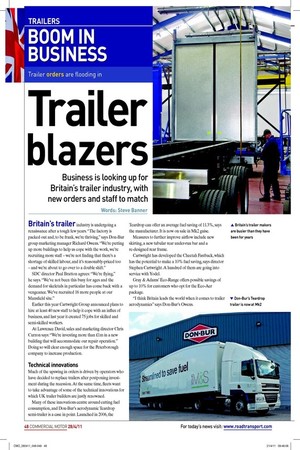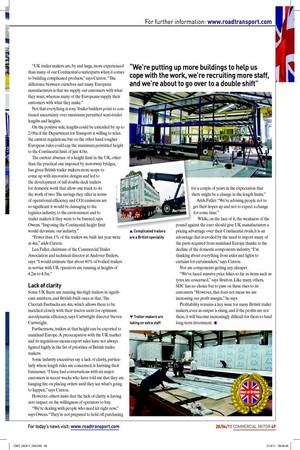Trailer
Page 41

Page 42

If you've noticed an error in this article please click here to report it so we can fix it.
blazers
Business is looking up for Britain’s trailer industry, with new orders and staff to match
Words: Steve Banner Britain’s trailer industry is undergoing a renaissance after a tough few years. “The factory is packed out and, to be frank, we’re thriving,” says Don-Bur group marketing manager Richard Owens. “We’re putting up more buildings to help us cope with the work, we’re recruiting more staff – we’re not inding that there’s a shortage of skilled labour, and it’s reasonably-priced too – and we’re about to go over to a double shift.”
SDC director Paul Bratton agrees: “We’re lying,” he says. “We’ve not been this busy for ages and the demand for skeletals in particular has come back with a vengeance. We’ve recruited 16 more people at our Mansield site.” Earlier this year Cartwright Group announced plans to hire at least 40 new staff to help it cope with an inlux of business, and last year it created 75 jobs for skilled and semi-skilled workers.
At Lawrence David, sales and marketing director Chris Curzon says: “We’re investing more than £1m in a new building that will accommodate our repair operation.” Doing so will clear enough space for the Peterborough company to increase production.
Technical innovations
Much of the upswing in orders is driven by operators who have decided to replace trailers after postponing investment during the recession. At the same time, leets want to take advantage of some of the technical innovations for which UK trailer builders are justly renowned.
Many of these innovations centre around cutting fuel consumption, and Don-Bur’s aerodynamic Teardrop semi-trailer is a case in point. Launched in 2006, the Teardrop can offer an average fuel saving of 11.3%, says the manufacturer. It is now on sale in Mk2 guise.
Measures to further improve airlow include new skirting, a new tubular rear under-run bar and a re-designed rear frame.
Cartwright has developed the Cheetah Fastback, which has the potential to make a 10% fuel saving, says director Stephen Cartwright. A hundred of them are going into service with Yodel.
Gray & Adams’ Eco-Range offers possible savings of up to 10% for customers who opt for the Eco-Aer package.
“I think Britain leads the world when it comes to trailer aerodynamics” says Don-Bur’s Owens. “UK trailer makers are, by and large, more experienced than many of our Continental counterparts when it comes to building complicated products,” says Curzon. “The difference between ourselves and many European manufacturers is that we supply our customers with what they want, whereas many of the Europeans supply their customers with what they make.” Not that everything is rosy. Trailer builders point to continued uncertainty over maximum permitted semi-trailer lengths and heights.
On the positive side, lengths could be extended by up to 2.05m if the Department for Transport is willing to relax the current regulations, but on the other hand tougher European rules could cap the maximum permitted height to the Continental limit of just 4.0m.
The current absence of a height limit in the UK, other than the practical one imposed by motorway bridges, has given British trailer makers more scope to come up with innovative designs and led to the development of tall double-deck trailers for domestic work that allow one truck to do the work of two. The savings they offer in terms of operational eficiency and CO2 emissions are so signiicant it would be damaging to the
logistics industry, to the environment and to trailer makers if they were to be banned, says Owens. “Imposing the Continental height limit would devastate our industry.” “Fewer than 1% of the trailers we built last year were at 4m,” adds Curzon.
Len Fuller, chairman of the Commercial Trailer Association and technical director at Andover Trailers, says: “I would estimate that about 60% of bodied trailers in service with UK operators are running at heights of 4.2m to 4.5m.”
Lack of clarity
Some UK leets are running 4m-high trailers in signiicant numbers, and British-built ones at that. The Cheetah Fastbacks are 4m, which allows them to be matched closely with their tractor units for optimum aerodynamic eficiency, says Cartwright director Steven Cartwright.
Furthermore, trailers at that height can be exported to mainland Europe. A preoccupation with the UK market and its regulations means export sales have not always igured highly in the list of priorities of British trailer makers.
Some industry executives say a lack of clarity, particularly where length rules are concerned, is harming their businesses. “I have had conversations with six major customers in recent weeks who have told me that they are hanging ire on placing orders until they see what’s going to happen,” says Curzon.
However, others insist that the lack of clarity is having zero impact on the willingness of operators to buy.
“We’re dealing with people who need kit right now,” says Owens. “They’re not prepared to hold off purchasing for a couple of years in the expectation that there might be a change in the length limits.” Adds Fuller: “We’re advising people not to get their hopes up and not to expect a change for some time.” While, on the face of it, the weakness of the pound against the euro should give UK manufacturers a pricing advantage over their Continental rivals, it is an advantage that is eroded by the need to import many of the parts required from mainland Europe thanks to the decline of the domestic components industry. “I’m thinking about everything from axles and lights to curtains for curtainsiders,” says Curzon.
Nor are components getting any cheaper.
“We’ve faced massive price hikes so far as items such as tyres are concerned,” says Bratton. Like many others, SDC has no choice but to pass on these rises to its customers. “However, that does not mean we are increasing our proit margin,” he says.
Proitability remains a key issue for many British trailer makers, even as output is rising; and if the proits are not there, it will become increasingly dificult for them to fund long-term investment. ■














































